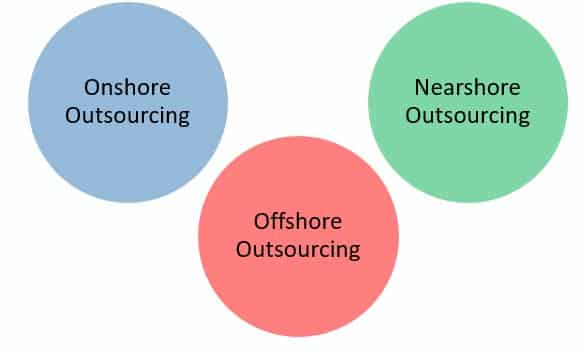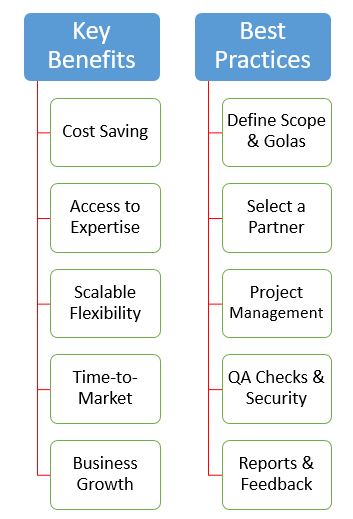Table of Contents
ToggleYou must be wondering about the buildup of offshore software development company and why everyone is talking about it all of a sudden. Primarily, the reason is the news that the average net profit margin of US software companies is around 43%. It means that the company charges a fairly high price compared to its offshore rivals. In addition, cost-effective access to a global talent pool and distant working trends are allowing firms to hire remote resources.
However, it is essential to review the different types of software development outsourcing based on location. We will also highlight the offshore software development process in detail and the key benefits of offshore outsourcing. Further, the best practices of offshoring software development projects will guide your endeavors in the right direction with suitable partners.
Types of Software Development Outsourcing
There are many categories of outsourcing, depending on the nature, objectives, activities, and niche. However, the most famous types are the ones based on the firm’s location in comparison to its potential partners. The following is the location-wise breakdown for your reference.

1. Onshore Outsourcing
Onshoring is the name given to hiring an agency in the same country that your business operates in. It is the most basic form where people usually search for a nearby service provider, but it’s also the most expensive one. The cost of living and doing business in the US is significantly higher than most of the world, pushing prices upwards. Enterprises still prefer onshoring due to trust, credibility, and knowledge of regulatory compliance or local industry.
2. Nearshore Outsourcing
Nearshoring refers to subcontracting different services or projects to an agency operating in neighboring countries or those within the same region. It is more of a hybrid approach to modern outsourcing where costs are relatively lower with lower potential risks. The flow of capital to the nearby countries develops the region, while the flow of physical goods might bear some duties.
3. Offshore Outsourcing
Offshoring is contracting out services, projects, or sets of tasks to companies in regions far from the US. Most of the time, African, Asian, and other developing markets are given projects as the cost of development is lowest. Offshore outsourcing is not only cost-effective but also opens up immense opportunities by focusing on customer service and business growth.
What is Offshore Software Development?
Offshore software development refers to the subcontracting of development services, project deliverables, or software fragments to firms outside the US. Usually, such agencies are in distant regions like Africa, Asia, and the Middle East, where software development costs are lowest. US firms benefit from the lower cost of production by outsourcing their projects to offshore agencies without compromising quality. If done right, outsourcing not only eliminates the need to manage in-house teams but also offers many other benefits.
Benefits of Offshore Outsourcing
Whether you are looking for offshore outsourcing software development or other IT services, the benefits are immense. The following are the most promising advantages that encourage US firms to find offshore agencies for outsourcing.
1. Saves Costs
Contracting out to an agency saves the costs of hiring and managing an in-house team or licenses and infrastructure. It allows businesses to run operations smoothly without the technical worries about the underlying stack or technology.
2. Access to Expertise
Service companies have expert professionals in most IT domains, all under the same roof, with broad industry experience. Access to diverse expertise in the budget is beneficial for the quality of the solution, as well as the efficient handling of technical issues.
3. Scalability and Flexibility
Software development offshoring provides the ease of starting and managing multiple projects at once without affecting quality. In addition, the flexibility to adjust the pace and resource allocation further justifies investing in offshore software development.
4. Lowers Time-to-Market
No matter how short the lead time, offshoring allows you to finish projects in time with no extra costs. Weathered developers work faster on your solution by lowering the time-to-market of the final deliverable, aiding you with a timely launch.
5. Focus on Business Growth

Delegating new product development responsibilities and pains to offshore partners permits you to focus on business growth. With continuous updates and progress reports, you can easily focus on growing the client base or tapping into expansion opportunities.
Best Practices of Offshoring Software Development
Similar to any other process, software development offshoring also has its best practices and guidelines. We have compressed the best practices for offshoring software development in the following headings, which will assist you in your endeavors.
1. Define Scope and Goals
Clearly define your desirable outcomes from the software product and set out a scope for the project. Define the boundaries and the specific milestones, let alone the requirements, along with any internal or external integrations.
2. Select a Suitable Partner
Due diligence is the first step to selecting a reliable partner, where you must review their portfolio and assess client testimonials. Reaching out to their past clients would explain their work ethics and organizational culture, along with their technical expertise.
3. Effective Project Management
Agile methodology and strong project management tools can assist you in effective handling and vigilant monitoring. Hiring an in-house project manager is a better approach, but you still need to understand its core essentials.
4. Quality Checks and Data Security
QA scores, KPIs, and other quality checks are helpful in determining the build quality, whereas security testing ensures data safety. Many offshore companies offer cybersecurity outsourcing and perform security testing before passing on deliverables for reliability.
5. Progress Reports and Feedback
Continuous progress reports, updates, and suggestions must ensue once the work begins. It helps you provide timely feedback and request more improvements, enhancements, or iterations. Effective communication is the key to collaborative goal-driven development.
Conclusion
This blog covers the domain of offshore software development by explaining outsourcing types, specifically offshore outsourcing. It also highlights the most imperative benefits of offshoring, like cost saving, access to expertise, scalability, flexibility, time-to-market, and growth. Finally, it also discusses the best practices of software development offshoring for a clear perspective.
Unique Software Development is a pioneer in the US software industry with regional offices in and outside the US. It has a global team of professional developers and designers with in-depth technical knowledge and broad industry experience. Contact us for onshoring or offshoring your software development projects for reliable solutions and credible outsourcing partnerships.









